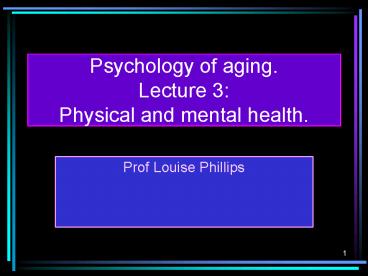Psychology of aging' Lecture 3: Physical and mental health' - PowerPoint PPT Presentation
1 / 21
Title:
Psychology of aging' Lecture 3: Physical and mental health'
Description:
BBC News website. 4/10/05. 7. Functional health. Activities of daily ... NHS Scotland: Improving Mental Health ... BBC News Website: 11 October 2006 ... – PowerPoint PPT presentation
Number of Views:889
Avg rating:3.0/5.0
Title: Psychology of aging' Lecture 3: Physical and mental health'
1
Psychology of aging.Lecture 3 Physical and
mental health.
- Prof Louise Phillips
2
Lifespan v healthspan
- Lifespan substantially increased
- Attention now focussed on healthspan
- length of healthy life before disabling
physical illness. - Also - maximising quality of life
- functional limitations
- activities of daily living
3
Most common chronic conditions in old age.
- Arthritis
- Osteoarthritis Stiff joints due to weakened
cartilage - Rheumatoid arthritis Immune system attacks
joints so they become inflamed - Diabetes
- Type I and Type II
- Cancer
- In men lung, prostrate, colon
- In women lung, breast, colon
4
Vascular respiratory changes with age
- Cardiovascular changes
- Blood vessel walls thicken
- Circulation of blood impaired
- Myocardial infarctions
- Cerebrovascular accidents
- Poorer respiratory function with age
- Particularly in smokers
- Respiratory capacity decreases 40 from age 20 to
age 85 - Restricts oxygen to the brain
5
Health and cognition in old age
- Ferucci et al (1993)
- 385 77-78 year old adults in Florence
- Correlation between number of chronic conditions
and intelligence test score -.58.
6
Physical exercise
- Exercise improves
- Health and physical fitness
- Mood, sleep and susceptibility to stress
- Cognitive functions such as attention and memory
- Physical benefits as strong in those aged 80
- Colcombe Kramer (2003)
- Exercise improves cognitive function
Exercise now to cut dementia riskBBC News
website. 4/10/05
7
Functional health
- Activities of daily living
- Disability
- Health behaviours
8
Activities of daily living
- Increased focus on functional impairment
- Basic activities of daily living (ADLs)
- Essential to independent living
- e.g. get out of bed, bathe
- 15-20 of those aged 85 problems ADLs
- Instrumental activities of daily living (IADLs)
- e.g. washing clothes, shopping
9
Disability in later life
- Pathology
- Medical conditions
- Impairments
- Structural dysfunctions
- Functional limitations
- Action restrictions
- Disability
- Problems in activities of daily life
10
Seeking medical help
- Older people tend to be health optimists
- self-ratings of health good predictor of
longevity. - Those aged 75 visit doctor twice as often as
those aged 45-64. - Doctors spend less time with older patients.
- Managing disability, not treating disease
- Problems with ADLs common cause visits.
11
Adult aging and mental health
- Depression and dementia
12
Epidemiology of mental health problems
- People aged 18-24 twice rate of mental health
problems of those aged 65. - Community studies may underestimate prevalence in
older adults. - For older adults, specific diagnosis issues
- Potential confusion depression/dementia
- Changes in sleep and eating patterns
- Complex interaction with physical health
13
UK hospital mental health admissions people
particular diagnoses
14
Scottish figures on prevalence of depression.
NHS Scotland Improving Mental Health Services,
Feb 2005.
15
Depression incidence in older adults
- Old lower levels depression than young?
- controversy about incidence
- underreported and underdiagnosed?
- Symptoms in old age cognitive/physical.
- Risk factors for depression in old age
- physical illness
- caregiver
- reduction in social contact
16
Dementia
- Belsky the complete unravelling of the self
- severe and progressive cognitive decline
- Typical symptoms
- severe memory problems
- loss of language
- poor judgement
- inappropriate social behaviour
- disorientation
17
Matthews et al. (2005). The Incidence of Dementia
in England and Wales
85 8
80-84 2
70-79 1
65-69 0.5
18
Types of dementia
- Affects around 2-5 of those aged 65
- Vascular Dementia
- Blockage of brain blood vessels
- Repeated strokes
- Symptoms sudden
- Alzheimers Disease
- Neuritic plaques and tangles
- Gradual onset of cognitive problems
- No definite diagnosis till death
19
Interventions
- Medication
- Aspirin and warfarin slow development of vascular
dementia - Cholinesterase inhibitors improve memory function
in Alzheimers Disease. - Environmental support
- e.g. simplify daily tasks, reminder notices
- May help memory problems in early stages
- Assistance for caregivers
Alzheimer's drugs appeal refusedBBC News
Website 11 October 2006
20
Conclusions
- Arthritis, vascular and respiratory diseases
common in old age. - Can impact on cognitive function.
- Increased focus on functional limitations and
managing disability. - Physical exercise can improve health, mood and
cognition. - Mental health disorders in old age
- dementia and depression most common
21
Questions to think about...
- Describe some of the most common health problems
in old age. - Outline some of the effects of physical exercise
on older adults. - What are activities of daily living?
- How does the incidence of mental health problems
change with age? - What are the main types of dementia and what
interventions exist to treat them?































